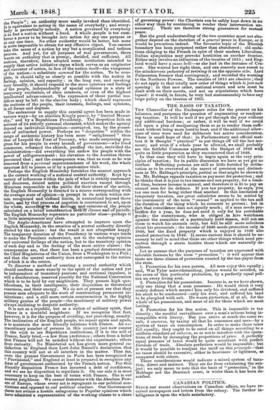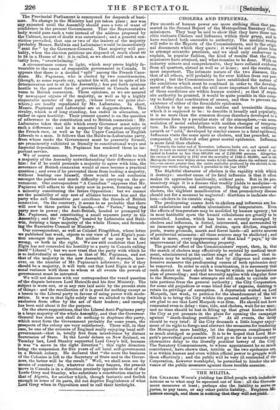CANADIAN POLITICS.
SINCE our recent observations on Canadian affairs, we have re- ceived newspapers and letters from the colony. The further in- telligence is upon the whole satisfactory. The Provincial Parliament is summoned for despatch of busi- ness. No change in the Ministry had yet taken place ; nor was any expected until the Assembly should pass a vote of want of confidence in the present Government. That the Representative body would pass such a vote instead of the address proposed by the Cabinet, no sort of doubt was entertained; and a general con- viction prevailed, that one or two of the leaders of the majority {probably Messrs. Baldwin and Lafontaine) would be immediately " sent for" by the Governor-General. That majority will pro- bably, when the election petitions are disposed of, reach about 60 to 24 in a House of 84: it is called, as we should call such a ma- jority here, " overwhelming." A circumstance comes to light, which may prove highly fa- vourable to the cause of responsible government in Canada. It appears that there is a decided "split" among the French Cana- dians. Mr. Papineau, who is elected by two constituencies, (though, as some reports say, against his will, and in spite of his determination not to sit in the Assembly,) has put forth opinions hostile to the present form of government in Canada and ad- verse to British connexion. Those opinions, as we are assured by newspaper organs of the majority, as well as by a highly respectable member of the party, (whose letter we print else- where,) are loudly repudiated by Mr. Lafontaine. In short, Messrs. Papineau and Lafontaine are at daggers-drawn. This rivalry, which is of long standing, has ended in alienation, or rather in open hostility. Their present quarrel is on the question of adherence to the constitution and to British connexion : Mr. lAfontaine takes that side which every Governor must take in such a difference; and he is supported by the great majority of the French race, as well as by the Upper Canadian or English Liberals to a man. It follows that the Baldwin-Lafontaine party, from whose ranks the Government must be presently formed, are prominently exhibited as friendly to constitutional ways and Imperial dependence. Mr. Papineau has rendered them an im- portant service.
We of course assume, however, that they will be able to lead a majority of the Assembly notwithstanding their difference with him : for if he could persuade a majority to agree with him, the severance of British connexion would at once become a practical question ; and even if he prevented them from leading a majority, without leading one himself, there would be sad contusion amongst the parties and much difficulty in carrying on the go- vernment. Our correspondent "A Canadian " supposes that Mr. Papineau will adhere to the party now in power, forming one of a minority constituting the future Opposition : but we cannot see the possibility of any sort of alliance between him and the party who call themselves par excellence the friends of British connexion. On the contrary, it seems to us probable that there will now be three parties in Canada,—the "Tories," being the party now in power ; the Anti-British, headed or prompted by Mr. Papineau, and constituting a small separate party in the Assembly ; and the " Liberals," headed by Lafontaine and Bald- win, forming a large majority of the whole House, and furnish- ing the Executive Council or Ministry. Our correspondent, as well as Colonel Fitzgibbon, whose letter we published last week, objects to our view of Lord Elgin's posi- tion amongst the parties. But neither of us may be in the wrong, or both in the right. We are still confident that Lord Elgin has not concealed his hostility to a party in Canada calling itself " Liberal "; but we now trust that the party with which he is so individually at variance, is that of Mr. Papineau, and not that of the majority in the new Assembly. All depends, how- ever, on the number of Mr. Papineau's adherents; for if they should be a majority, it will turn out that Lord Elgin is at per- sonal variance with those to whom at all events the powers of government must be intrusted.
We will not discuss with our correspondent the vexed question of the dispute between Lord Metcalfe and his first Ministry. The subject is worn out, or at any rate laid aside by the present state of things : and the recollection of it is good for nothing except as a lesson to the Liberal party in favour of using power with mode- ration. It was in that light solely that we alluded to their long exclusion from office by the act of their leaders ; and enough has been said about it for the purpose. On the above suppositions, that the Liberal Anti-Papineau party is a large majority of the whole Assembly, and that the Governor. General has done and shall do nothing to displease this party, which must form the Government probably for some years, the prospects of the colony are very satisfactory. There will, in that case, be one of the colonies of England really enjoying local self- government—that is, totally free from interference by distant Secretaries of State. In the Lords' debate on New Zealand, on Tuesday last, Lord Stanley supported Lord Grey's bill, because it was "a move in the right direction"; this right direction being the suspension for five years of all local selt-government in a British colony. He declared that "the more the business of the Colonies is left to the Secretary of State and to the Gover- nors, the better will be the result." Well, we shall soon see by Means of contrast : for, whatever else may happen, the present move in Canada is in a direction precisely opposite to that of the -Lords Grey and Stanley, who substitute a constitution similar to that of Algeria, for another which, though fantastic and foolish enough in some of its parts, did not deprive Englishmen of what Lord Grey when in Opposition used to call their birthright.



























 Previous page
Previous page